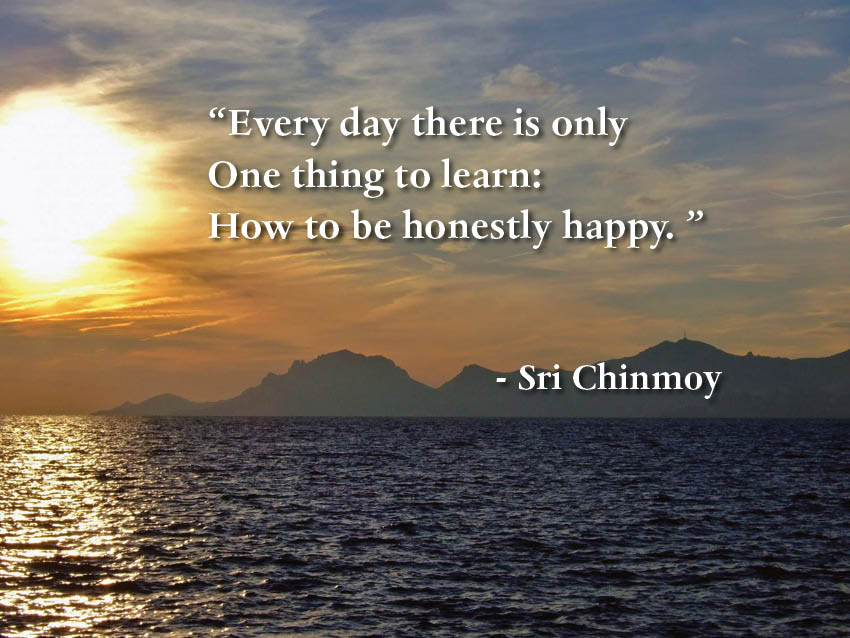Real happiness and genuine spiritual progress requires an ability and willingness to be honest with ourselves. We could call it self-criticism, but I prefer honesty. If we can be honest about our motives and actions, we will learn to cultivate a more self-giving attitude and keep our ego in check.
This self-awareness and personal honesty, doesn’t mean we have to be overly critical of ourselves. We are not trying to make ourselves feel guilty; it is not about confessing sins, but a willingness to understand our true motivations and be aware of our shortcomings. If we always live with an attitude of self-justification and feel we are always right, we will struggle to make any real progress and will be more prone to pride and insecurity. But, if we can be honest and aware of our shortcomings, we can become the person we really want to. It may be a little hard work, but it will pay off in the long run!
These are some exercises we can take to make sure we are not living in a bubble.
1. Motive. Before undertaking an action what is the motive behind it? If we are undertaking an action, why are we doing it? Would we still do it if nobody was aware of it? It is not wrong to welcome appreciation of others. But, if our action is only motivated by the desire to please others or show off, then we are only feeding our ego and it can cause problems. A pure motive helps us to transcend the ego and we gain satisfaction from extending our sense of oneness.
2. Criticism? Do we put other people down to make us feel better? There is a part of us that tries to bolster our self-esteem by feeling better than others. This can make us critical of other people. We may not even be aware we are doing this, unless we can be really honest about our motives. Instead, we should feel our self-esteem can be built by encouraging and being sympathetic to others. It means avoiding the temptation to jump onto a train of gossip. It means we need to cultivate more self-belief and self-confidence.
3. Do we spend too much time making excuses?
It is human nature to try and blame our misfortune on other people and outer circumstances. But, shifting the blame onto other people is often a clever way of hiding our own shortcomings. Sometimes we think that only if we can move away from people who make life difficult for us, everything will be OK. But, when we do move somewhere else, we find the same problems are just as prominent. This is because the weakness is stemming from ourselves. We only see the our limitations reflected in other people.
- “The only devils in this world are those running around in our own hearts, and that is where all our battles should be fought.”
- – Mahatma Gandhi
If we are prone to anger, we can always blame the situation and the actual trigger for our anger. But, this will never deal with the underlying problem. Instead, we should make a conscious decision to overcome anger, and bring peace into our system. Here honesty is helping us to become aware of our shortcomings and helps us to realise that it is up to us to decide what will causes us to lose our inner peace.
4. Do we seek flattery / sympathy? Are we looking for sympathy / praise? Sometimes we go ‘fishing’ for sympathy or praise. If we subconsciously seek sympathy, this can encourage a sense of self-pity and weakness. If we have misfortune, is part of us enjoying the sympathy we get? We have to keep asking ourselves, are we trying our hardest to create a positive outcome?
5. False modesty. Do we make a big show of trying to prove our humility and modesty? Humility does not mean making ourselves invisible, humility means accepting with good grace what life puts on our plate. Sometimes, when we try to be humble, it is a false humility, and really it is our ego that is seeking reassurance. Real modesty and humility means we try to maintain an attitude of gratitude for whatever role we need to play on life’s stage.
There is a fine line between genuine self-awareness and being too harsh on ourselves. But, honesty and a mindfulness of our state of being
Poem top:
Sri Chinmoy, Ten Thousand Flower-Flames, Part 70, Agni Press, 1983
Photo: Menaka, Sri Chinmoy Centre Galleries
